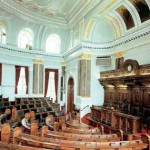Educating Archers
Although The Archers fan club has suggested ‘We don’t think that any character has studied with The Open University’, in recognition of the special interest group at the online Village Hall, Ambridge, where OU students meet, this blog is marking sixty years of the broadcasting of the soap by suggesting a connection.
As other postings have noted (eg 15th December 2010) many countries ran their own radio-inspired discussion groups for farmers and connected broadcasting to learning in ways upon which the OU could build. In the UK, however, the BBC opted not only for discussion groups but started to broadcast a radio soap, The Archers, in order to provide advice for farmers. In 1948 a farmer proposed to a Ministry of Agriculture meeting (held, according to one source, in Birmingham Council Chamber pictured) that a daily radio serial could help increase food production. BBC agricultural producer Godfrey Basely developed the notion and in 1951, the first episode of The Archers, including material from the Ministry of Agriculture, was broadcast. For an account see here.
The BBC takes up the story: “I couldn’t find any listeners to listen to the standard BBC-type of farming programme,” recalled Godfrey Baseley. Conferences were organised to ask what farmers wanted. Eventually, Mr Henry Burtt of Dowsby, Lincolnshire, stood up and cleared his throat. “What we farmers want is a farming Dick Barton,” he is reported to have said. “Well, of course, everybody burst out laughing,” said Baseley. Yet, after attempting a couple of scripts himself, Baseley brought in the writers of Dick Barton – Edward Mason and Geoffrey Webb – to help out and with that, Dan Archer – The Special Farmer was born.
The BBC World Service and the World Service Trust, its charitable arm that specialises in development projects, went on to develop a number of television and radio soaps which addressed development issues and sought to raise awareness of social problems. in Central and Latin America there was sustained use of television and radio drama in pursuit of social development. See N. Vink, The Telenovela and Emancipation: A Study on TV and Social Change in Brazil. Royal Tropical Institute, Amsterdam, The Netherlands. 1988. Issues related to rapid industrialisation, modernity, nationalism and social change have all been addressed. J. Martín-Barbero, ‘Memory and form in the Latin American soap opera’, in R. Allen, (ed.), to be continued…Soap Operas Around The World. Routledge, London, 1995.